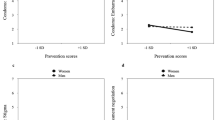Abstract
Why do people frequently persist with unhealthy life-styles when they know they are harming themselves? To investigate the role of several personality variables, 114 depressed, antisocial, and normal individuals read health promotion and disease prevention communications about alcohol abuse, lack of exercise, and sexually transmitted diseases (STDs). The results revealed that, compared to a low-coping ability information condition, a high-coping ability condition motivated normal individuals to protect themselves but did not motivate either depressed or antisocial individuals. Additional findings indicated that threat appeals worked only if people were persuaded that they could cope with the health threats; attempts to frighten people without reassuring them had a deleterious effect. Men were more concerned than women about the costs of drinking in moderation, exercising, and protection against STDs and were more reluctant than women to give up the pleasures associated with heavy drinking and unprotected sex.
Similar content being viewed by others
References
American Psychiatric Association (1987).Diagnostic and Statistical Manual of Mental Disorders, 3rd ed. rev., APA, Washington, D.C.
Basow, S. A. (1986).Gender Stereotypes: Traditions and Alternatives, 2nd ed., Brooks-Cole, Monterey.
Beck, A. T. (1987). Cognitive models of depression.J. Cognit. Psychother. 1: 2–27.
Beck, K. H., and Frankel, A. (1981). A conceptualization of threat communications and preventive health behavior.Soc. Psychol. 44: 204–217.
Beck, A. T., Rush, A. J., Shaw, B. F., and Emery, G. (1979).Cognitive Therapy for Depression, Guilford Press, New York.
Cleckley, H. (1964).The Mask of Sanity, Mosby, St. Louis.
Corah, N. L., Koch, R. E., and Eisenberg, L. S. (1977). Use of fear appeals to change oral hygiene behavior. Paper presented at the meeting of the International Association for Dental Research, Copenhagen.
Gough, H. G. (1975).Manual for the California Psychological Inventory (rev. ed.), Consulting Psychologists Press, Palo Alto, Calif.
Hovland, C. I., Janis, I. L., and Kelley, H. H. (1953).Communication and Persuasion, Yale University Press, New Haven, Conn.
Jaccard, J., Becker, M. A., and Wood, G. (1984). Pairwise multiple comparison procedures: A review.Psychol. Bull. 96: 589–596.
Kleinot, M. C., and Rogers, R. W. (1982). Identifying effective components of alcohol misuse prevention programs.J. Stud. Alcohol. 43: 802–811.
Leventhal, H. (1970). Findings and theory in the study of fear communications. In Berkowitz, L. (Ed.),Advances in Experimental Social Psychology, Academic Press, New York, pp. 119–186.
Leventhal, H., and Cameron, L. (1990). Persuasion and health. In Brock, T., and Sharitt, S. (eds.),Psychology of Persuasion, Freeman, New York (in press).
Maddux, J. E., and Rogers, R. W. (1983). Protection motivation and self-efficacy: A revised theory of fear appeals and attitude change.J. Exp. Soc. Psychol. 19: 469–479.
Megargee, E. I. (1972).The California Psychological Inventory Handbook, Jossey-Bass, London.
Prentice-Dunn, S., and Rogers, R. W. (1986). Protection motivation theory and preventive health: Beyond the health belief model.Health Educ. Res. 1: 153–161.
Quay, H. C. (1965). Psychopathic personality and pathological stimulation seeking.Am. J. Psychiat. 122: 180–183.
Rippetoe, P. A., and Rogers, R. W. (1987). Effects of components of protection motivation theory on adaptive and maladaptive coping with a health threat.J. Personal. Soc. Psychol. 52: 596–604.
Robberson, M. R., and Rogers, R. W. (1988). Beyond fear appeals: Negative and positive persuasive appeals to health and self-esteem.J. Appl. Soc. Psychol. 18: 277–287.
Rogers, R. W. (1983). Cognitive and psychological processes in fear appeals and attitude change: A revised theory of protection motivation. In Cacioppo, J. R., and Petty, R. E. (eds.),Social Psychology: A Sourcebook, Guilford Press, New York, pp. 153–176.
Rogers, R. W., and Mewborn, C. R. (1976). Fear appeals and attitude change: Effects of a threat's noxiousness, probability of occurrence, and the efficacy of coping responses.J. Personal. Soc. Psychol. 34: 54–61.
Schalling, D. (1978). Psychopathy-related personality variables and the physiology of socialization. In Hare, R. D., and Schalling, D. (eds.),Psychopathic Behavior: Approaches to Research, Wiley, New York, pp. 85–106.
Sutton, S. (1982). Fear-arousing communications: A critical examination of theory and research. In Eiser, J. (eds.),Social Psychology and Behavioral Medicine, Wiley, New York.
Wurtele, S. K., and Maddux, J. E. (1987). Relative contributions of protection motivation theory components in predicting exercise intentions and behavior.Health Psychol., 6: 453–466.
Zimmerman, M. (1986). The stability of the revised Beck Depression Inventory in college students: Relationships with life events.Cognit. Ther. Res. 10: 37–43.
Author information
Authors and Affiliations
Rights and permissions
About this article
Cite this article
Self, C.A., Rogers, R.W. Coping with threats to health: Effects of persuasive appeals on depressed, normal, and antisocial personalities. J Behav Med 13, 343–357 (1990). https://doi.org/10.1007/BF00844883
Accepted:
Issue Date:
DOI: https://doi.org/10.1007/BF00844883




